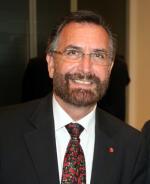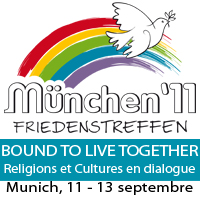
Rabbi, International Director of Interreligious Affairs, AJC
|
The transformation in the Catholic-Jewish relationship since the Second Vatican Ecumenical Council has been dramatic. Arguably there is nothing com[arable in human history.
A community that was once seen as condemned and rejected by God; guilty of deicide: enemies of God and in league with the Devil; is now seen by the Church , in the words of Blessed Pope John Paul II as "the dearly beloved elder brother of the Church, the people of the original Covenant never broken and never to be broken".
Both Blessed John Paul II and Pope Benedict XVI have reiterated that the Church has a relationship with Judaism that is unique and incomparable to Christianity's relationship with any other religion, because it embodies the Church's very roots. Thus they echo section 4 of Nostra Aetate that ushered in this revolution.
The subsequent Vatican Guidelines on Nostra Aetate promulgated in 1974, expanded on this new understanding of the relationship with the Jewish People both past and present and advocated for a process of dialogue.
A Pontifical Commission for Religious relations with Jewry was established by the Holy See and a formal structure for regular dialogue was established known as the International Jewish-Catholic Liaison Committee which this year celebrated its fortieth anniversary at its meeting held in Paris.
Blessed Pope John Paul II’s contribution to this journey of reconciliation was particularly remarkable. While significant relevant documents were promulgated during his pontificate contributing to this process; his own personal statements were of the utmost importance. But perhaps above all, John Paul II was the master of symbolic acts.
It was arguably his visit to the Great Synagogue in Rome in 1986 which served to convey an even more profound message to the world; as did the establishment of full diplomatic relations between the Holy See and the State of Israel, which was facilitated by the Pope’s personal involvement.
However it was probably the Papal pilgrimage to the Holy Land that provided the ultimate testimony of the degree of the transformation in Christian-Jewish relations.
The image of the Pope seen by millions, standing in tearful solidarity with Jewish suffering at the Yad Vashem Holocaust memorial; and in prayerful respect for Jewish tradition at the Western Wall placing there the text of the prayer he had composed for a service of repentance in the Vatican shortly beforehand, asking Divine forgiveness for sins perpetrated in the name of Christianity against Jews down the ages; had an enormous impact on the Jewish world and, I suspect, on the Christian world as well.
In effect, he personified the process of not only friendship, but the rediscovery of brotherhood.
With the establishment of the bilateral commission of the Chief Rabbinate of Israel with the holy See, the fruit of that papal pilgrimage, we have seen dialogue and friendship taken to new heights.
This Commission has focused on the discovery of our profound shared values and teachings while respecting our significant differences. In effect what it seeks to do is to identify our common message for the welfare of humanity at large.
In addition to deepening this process, we face two great tasks. The more laborious but perhaps most essential one is to translate this transformation more extensively into the pews and grass roots; and even to some of the shepherds and hierarchy who sometimes still think and even teach and preach under the impact of the old “teaching of contempt”, or at least in its shadow.
Indeed in terms of our history, this transformation is very new and we have almost two millennia of negative indoctrination to overcome.
Aside from simple ignorance, replacement theology is still quite prevalent and often other extraneous factors such as the conflict in the Middle East are utilized to avoid or prevent effective integration of the new theological understanding into the minds and hearts of faithful Christians throughout the world.
Moreover as Pope Benedict XVI and other prominent prelates and theologians have noted, the full theological implications of Nostra Aetate, have not yet been fully plumbed.
This leads me to the second challenge, which is to develop a serious theology of partnership between Christians and Jews and an understanding of the other’s complimentarity. Efforts at doing so have already begun.
These have included seeing Judaism and Christianity in a mutually complementary role in which the Jewish focus on the communal covenant with God and the Christian focus on the individual relationship with God, may serve humanity in parallel as well as balance one another.
Others have seen the complementary relationship in that we both need to be reminded that the Kingdom of Heaven has not yet fully arrived, and yet at the same time to appreciate that that Kingdom is already rooted in the here and now.
Another view of the mutual complementarity, portrays Judaism as a constant admonition to Christianity regarding the dangers of triumphalism, while Christianity’s universalistic character may serve an essential role for Judaism in warning against degeneration into insular isolationism.
As opposed to the underlying assumptions of the latter, there is a contention that it is actually Christianity’s universalism that is challenged by the modern culturally pluralistic reality. The communal autonomy that Judaism affirms, it is suggested, may serve more appropriately as a model for a multicultural society, while Christianity may provide a better response for individual alienation in the modern world.
In addition, Jewish as well as Christian theologians have written about the mutual theological assistance Jews and Christians can provide one another in overcoming the burdens of history.
It has also been pointed out that Jewish-Christian reconciliation itself has impacted on society well beyond the bilateral dialogue. Accordingly it serves both as a universal paradigm of reconciliation and should serve as an inspiration for Jews and Christians for dialogue, especially with Islam and even beyond in the multifaith encounter.
Indeed, even the widespread acceptance that our shared ethical values and moral responsibilities demand our cooperation and collaboration – today more than ever before, as we face the challenges of the dominant secular culture in which all religions are minorities – has theological implications for our relationship.
Blessed Pope John Paul II expressed this beautifully when he observed that “Jews and Christians are called (as the Children of Abraham) to be a blessing for humankind. In order to be so, we must first be a blessing to one another”. What then are the theological implications of such mutual blessing?
All these aforementioned ideas are an intimation of the ultimate theological challenge that we who labor in love in this vineyard of Jewish-Christian relations are called to address with increasing candor and depth.
In effect, these challenges require us to go even beyond dialogue and friendship
How may we understand not only each other’s integrity as each defines one’s self, but furthermore understand each other’s role accordingly in the Divine plan for humanity and understand our relationship in these terms?
What is God saying to us in this regard ? How may we benefit from one another? How may we truly become a blessing to one another in the deepest sense possible?
The fact that we live in the generation that can ask and seek answers to these questions is a gift that two thousand years of our ancestors can only gape at in wonder. May we be worthy of this privilege. |

